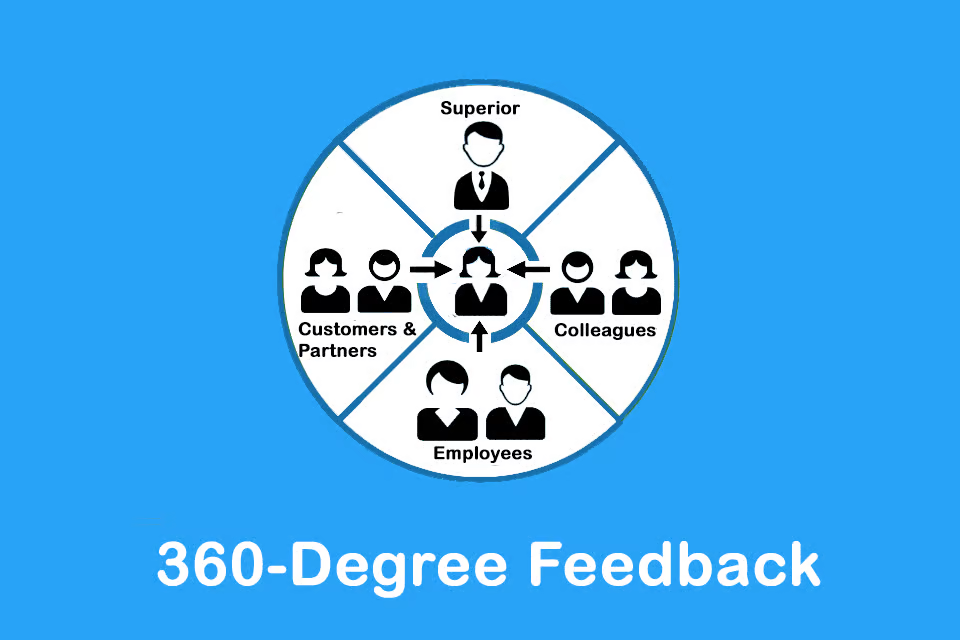
What 360-degree feedback can do for organisations varies significantly from organisation to organisation. Before we go deeper into what 360-degree feedback can do for any organisation, we must understand what it is. After that, we will share what scientific evidence says about what 360-degree feedback can achieve.
360-degree feedback is a systematic process of collecting feedback from multiple sources in the working environment. On many occasions, 360-degree feedback is sought as part of individual employee performance assessments. Some employers use 360-degree assessments and feedback to identify employees' development needs. Organisations predominantly use 360-degree feedback assessments when assessing the subject elements of employee performance.
I have noted that 360-degree feedback is more prevalent in executive coaching, performance evaluation, talent management, and succession planning. While in some areas, there are notable positive changes from utilising 360-degree feedback; there is equally sufficient scientific evidence to show that, in many instances, it results in no significant change in many of the targeted outcomes.
Research has much useful information about what 360-degree feedback can and cannot achieve in a work situation. There is a consensus on what 360-degree feedback can achieve. When done well, there is agreement that 360-degree feedback can positively impact individual work outcomes.
Research shows that the effect of 360-degree feedback is minimal though statistically significant. When done poorly, research shows that 360-degree feedback can lead to employee disengagement and, more importantly, it can lead to poor performance.
360-degree feedback can lead to unintended consequences. This meta-analysis shows that individual performance decreased in a third of the studies cited. The major reasons for this disappointing result is the depth of the feedback process and how feedback was delivered. Interestingly the individuals' personality was cited as a contributing factor.
Neuropsychological research has shown that negative feedback is potentially harmful to the employee. Other studies show that 360 feedback can generate negative sentiments in employees, especially where they receive negative feedback. For example, some studies have found that if a candidate is rated lower than expected, the candidate always thinks the assessment was inaccurate.
What 360-degree feedback can achieve or not achieve is subject to debate. There is consensus that when done well, 360 feedback can increase self-awareness. Some have claimed that it can improve team effectiveness, especially when used in a team-building environment.
- What is the role of a COO?
- Pay compression: What every manager needs to know
- Executive assistant job
- Job evaluation committees: How to make them effective
Keep Reading
This meta-analysis shows that 360-degree feedback can lead to the desired change and that perceptions about improved performance increase. The same research shows that changes were more in those individuals who were already motivated to receive feedback and to change.
Research has shown what 360-degree feedback can achieve based on certain conditions. This studyidentified eight significant criteria that play a role in determining the extent to which 360-degree feedback interventions result in a change in behavior and an increase in performance. These include how the feedback is delivered as well as it is content. Above this, how the individual interprets the feedback and their emotional response matters. The additional factors are the personality of the person receiving the feedback, the orientation of the feedback, readiness to change, beliefs regarding the change, goal intentions as opposed to implementation intentions, and taking and maintaining action while managing the risk of relapse.
To succeed, coaches need to personalize their approach to sharing feedback outcomes and establishing growth goalsto determine the level of readiness for change that their clients have, as well as evaluate significant personality traits.
One other area even more interesting in what 360-degree feedback can achieve is the impact of personality on how individuals take feedback from such assessments.
In this study exploring the impact of personality on 360 degree feedback, the results indicate that extroverted candidates seek feedback, and those high in emotional stability likely use the feedback. Candidates with conscientiousness were found to have used the feedback to engage in development activities. Those high on openness to experience were found to have valued the feedback as useful and explored ways to use it.
Studies have found that individuals with high self-esteem are more likely to react positively to feedback than those with low self-esteem.
Other studies show that those who rate themselves highly on receptivity and the desire to make a good first impression are also more likely to have positive reactions.
Research has shown that people with high levels of core self-evaluations (high self-esteem, generalised self-efficacy, internal locus of control and low neuroticism) are more likely to be motivated to change their behavior when they receive feedback lacking compatibility.
One big challenge with what 360-degree feedback can achieve is that studies have consistently shown that when leaders evaluate their abilities, they overate themselves. This problem was more prevalent in males than females. The same leaders are less receptive to 360 feedback.
Their research found that using the right amount of strength is associated with leadership success. Leveraging and emphasizing strength might prevent people from being flexible and adopting new behaviors (Harvard Business Review, 2009).
A study by Goffin and Anderson (2007) found that self-rating inflation is linked to high achievement, self-esteem, and social desirability. This study concluded that self-enhancers might exaggerate their strengths, leading to defensiveness and resistance during 360-degree feedback discussions.
Studies have shown that another group underratesitself relative to other raters. Regarding what 360 degree feedback can achieve with this group, results show that they are more nervous, emotionally reactive and anxious when receiving feedback.
Research shows that managers who worked with coaches when receiving 360 degree feedback set more measurable goals. In one study Thach (2002) discovered that in six weeks of executive coaching after 360-degree feedback, there was a 60% jump in performance. In another study,Olivero et al. (1997) discovered that feedback supported by coaching increased productivity significantly. It is evident from these studies that supportive coaching following 360 degree feedback has more impact on individuals and should be incorporated in cases where 360 degree feedback is given.
Another interesting twist to what 360 degree feedback can do is found in studies that explored the long-term consequences of 360 degree feedback in fostering behavior change. One study discovered that leaders who initially received unflattering feedback showed negative reactions, but when followed six months after the feedback sessions, they had created more improvement goals than others. This is a notable finding that practitioners in 360 degree assessments and coaching may need to watch as they go through such projects.
Other research shows that whether people adopt behavior change initiatives largely depends on how they view the usefulness of the feedback. However, this must be readin context as it is affected by the individual's personality.
What 360 degree feedback can achieve is evident from research. Practitioners must follow the directions given in scientific research if they want this to work.
- Memory Nguwi is an Occupational Psychologist, Data Scientist, Speaker, & Managing Consultant- at Industrial Psychology Consultants (Pvt) Ltd, a management and human resources consulting firm.Email:mnguwi@ipcconsultants.com or visit our websites https://www.thehumancapitalhub.com/ and www.ipcconsultants.com










